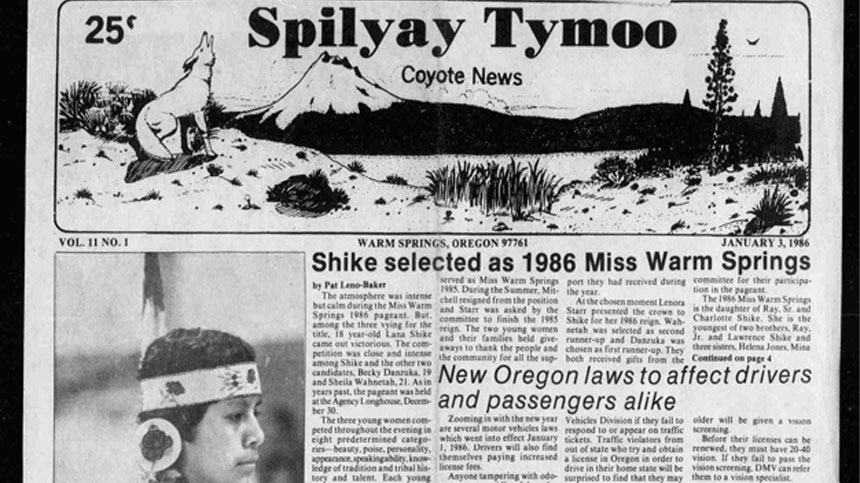Newspapers—like libraries—sit at the heart of their communities, documenting and archiving history and culture and offering new and important perspectives on those.

When it comes to underrepresented communities, much of that history, culture, and perspective has been hidden or lost. But the UO Libraries received a grant that will help us create a new partnership with Indigenous tribes willing to share their archives and allow us to digitize historic tribal newspapers.
This “grant represents an important contribution to the broader Oregon community,” said Vice Provost and University Librarian Alicia Salaz. “We’re very excited about this new partnership with Oregon’s federally recognized tribes and the State Library of Oregon to digitize and preserve fragile, paper-based tribal newspapers before they (and their important historical perspectives) are lost,” added Salaz.
The digitization project is part of the Oregon Digital Newspaper Program, committed to providing free online access to historic Oregon newspapers. Director of Digital Library Services Julia Simic shared just some of the impacts this grant can have on students, faculty members, and other library users and researchers:
- Increase diversity of our collections
- Build relationships with tribes around the state
- Contribute to the preservation and accessibility of these important materials
- Add to the content used for history-based research including genealogy research
Simic and Franny Gaede, director of the Department of Open Research, successfully negotiated and earned the State of Oregon Library’s renewable grant of $100,000 (Project # TRIBALNEWS23) to support the UO Libraries’ digitization and preservation of historic tribal newspapers. The funding support is a multiyear commitment, and the agreement will be renewed annually.
Part of the funding supports new hire Justin Spence, who has accepted the position of project manager for the Oregon Digital Newspaper Program. His primary responsibility is to lead the digitization of tribal newspapers from around Oregon. Spence has a PhD in Linguistics from UC Berkeley and has worked with indigenous communities as a rural educator and endangered languages documentor. He is currently teaching a class on Native American languages at the UO’s Clark Honors College. Spence brings with him experience as the director of the Native American Language Center at UC Davis and collections assistant at the Hearst Museum of Anthropology at UC Berkeley.
As with most hard-won grants, this was a team effort. Credits go to Sarah Beth Seymore, UO Libraries’ former digital collection metadata librarian, who launched the grant application process in coordination with Buzzy Nielsen, the program manager for Library Support for the State Library of Oregon as part of the state’s ongoing support of the ODNP, and to the Digital Library Services team. Digital Scholarship Librarian Elizabeth Peterson remains the program manager for ODNP and will be involved in onboarding and training Spence and coordinating other newspaper digitization projects with him.
This invaluable resource wouldn't be possible without the support of the nearly 80 donors who’ve contributed to the ODNP over the years along with friends and supporters, laying the groundwork for the program’s current success and future growth. Among those friends is Tracy Prince, PhD, author and educator who remembers doing research in UO Libraries for her first book, Portland's Goose Hollow, and how she discovered the ODNP.
"Having access to fully digitized newspapers from the early days of Oregon history was life changing! Back in the olden days, when I was finishing my PhD in 1997, I had to spend many late nights at libraries. Back then, researching meant holding a physical copy of a book, academic journal, or historical document in my hand. Using newspapers for research required hours of scrolling through microfiche or microfilm, hoping to randomly run across something of importance. Now, with ODNP's scans of historical newspapers, I could do keyword searches back to the 1850s! It changed everything about how I researched," Prince shared. An article for ODNP that Prince was interviewed for explores some of the discoveries she was able to make thanks to having access to this incredible resource that’s provided free to all.
To learn more about the evolution of the ODNP, read David G. Lewis’s story “Tribal News is Oregon History” (Summer 2018, p. 10) in Building Knowledge magazine.
—By Kate Conley, communications specialist, UO Libraries
